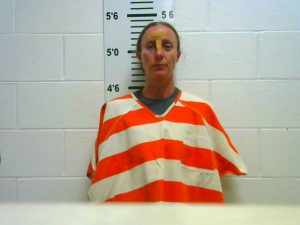News
Woman Kicks Officer in Chest During Public Intoxication Arrest
April 23, 2020
By: Dwayne Page
A woman being placed in custody for public intoxication kicked a deputy in the chest during the arrest.
33 year old Tamara Michelle Waddell of Lascassas is charged with public intoxication, assault, and resisting stop, frisk, halt, or arrest. Her bond is $3,000 and she will be in court June 11.
Sheriff Patrick Ray said that on April 6 a deputy was dispatched to Roy Womack Road due to a possible domestic incident. Waddell was found outside in the roadway extremely intoxicated. She became belligerent and started yelling and cussing. After several attempts to get her to calm down, the deputy placed her under arrest for public intoxication. As Waddell was seated in the back of the patrol car, she was able to get her cuffed hands from behind her back in front of her. When the officer spotted that he tried to get her out of the car to reapply the handcuffs behind her back but Waddell resisted and kicked the officer in the chest after leaning over in the seat. Waddell was subsequently subdued. The deputy was not seriously injured.
“Vol Network Classics” Saturday to Feature Rebroadcast of 2019 SEC Basketball Tournament Semi-Final Between UT and Kentucky
April 22, 2020
By: Dwayne Page
The Vol Network will continue its weekly radio series this Saturday called “Vol Network Classics”.
The aim is to give Tennessee fans the chance to relive some of the great moments and games from UT’s history. Each week, a replay of a famous football or basketball game will be broadcast.
The series is planned for a 10-week run Saturdays at 1:00 p.m. on WJLE AM 1480/ FM 101.7 and the Vol Network.
In week #2 of the series Saturday, April 25, fans can hear a rebroadcast of the 2019 SEC Basketball Tournament Semifinal game between #8 Tennessee and #4 Kentucky from March 16, 2019 in Nashville.
The game was a heavyweight back and forth slugfest. Tennessee Coach Rick Barnes compared the contest’s electric atmosphere and high-level play to a Final Four game. With under three minutes to go in the game the Vols were down eight points, but finished the game with a thrilling 18-6 run.
Later in the series, UT basketball fans can catch Tennessee’s first game at Kentucky’s Rupp Arena in 1977 and a top-ranked matchup vs. Memphis in 2008.
On the football side games include the 1986 Sugar Bowl win over Miami, the 1991 “Miracle at South Bend” against Notre Dame and the 2001 victory against Florida.
DCHS Valedictorian Anna Chew Expresses Disappointment Over How School Year is Ending Due to COVID-19
April 21, 2020
By: Dwayne Page
Anna Chew is working on her address to the graduating class at DeKalb County High School but the 2020 Valedictorian has a little more time to prepare now that the scheduled May 15 commencement has been postponed due to COVID-19.
School administrators are hoping to reschedule the graduation ceremony possibly in June or July. By that time, Chew said she will be more than ready.
“I am already working on my speech here and there. I’ve got a lot of ideas”.
Chew, a gifted academic student and champion golfer, is disappointed in the way her senior year is ending. A view shared by her fellow classmates.
“I know I speak for the entire class when I say that we miss seeing everybody at school including our teachers. We miss having the routine and the school work but we miss a bunch of the fun things we do at the end of the year too like Tiger Time Out or final pep rallies. We have been going through this school system all of our lives and to think we don’t get to finish it out with the closure that everybody else gets is really sad,” said Chew.
As an athlete, Anna also has a special feeling for her friends who didn’t get a chance to fulfill their dreams during the various spring sporting events such as soccer, softball, baseball, and tennis.
“I know they are missing their senior seasons and that is really sad. It breaks my heart because I got to play my senior season as a golfer and I know I would have been heartbroken to have had that taken away from me. I know that is really hard for them”.
Although school has been closed for several weeks now, Anna has kept up her academic studies and is ready for graduation whenever it comes.
“Toward the end of the year we kind of chill out a little bit anyway. We don’t have as much school work but we’re still getting online stuff through Google Classroom and that is helping us stay on track. Thankfully we have a group of great teachers who are putting in a lot of extra work. I know this first hand because my mom is a teacher at Northside Elementary so I see behind the scenes what goes into that. We are so thankful for our teachers,” said Chew.
Anna will be furthering her education this fall at Trevecca Nazarene University in Nashville where she earned a golf scholarship. While she hasn’t made up her mind yet, Chew said she may go into the field of pre-pharmacy or pre-physical therapy.
Having already missed the prom, which was set for April 3 but had to be cancelled, Anna said she and her classmates are hoping somehow that can be re-rescheduled as well as the graduation.
“I know we all want graduation and prom. I would like to give a big shout out to the entire class of 2020. I know this is hard on all of us but we will get through it,” added Chew.
Anna is the daughter of Lori Chew and George Chew and granddaughter of Larry and Gail Redmon.
« First ‹ Previous 1 1453 1543 1551 1552 15531554 1555 1563 1653 2543 Next › Last »










